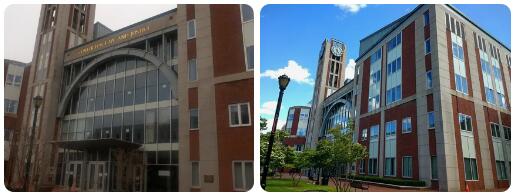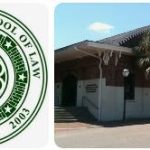Rutgers School of Law-Newark has a long and distinguished history. Founded in 1908, the school was originally known as the New Jersey Law School. Its original mission was to provide legal education to those who were unable to pursue a formal law degree at a traditional university setting. The first class graduated in 1909, and by the 1940s, the school had become one of the top legal educational institutions in the country. It was renamed Rutgers School of Law-Newark in 1950 when it became part of Rutgers University. The school has since grown and expanded its offerings, becoming one of only two accredited law schools in New Jersey and one of only four public law schools in the United States.
The school is home to several specialized centers, including the Center for Law and Justice, which focuses on civil rights issues; the Center for Global Justice; and the Institute for Professional Education. Additionally, Rutgers School of Law-Newark is home to several student organizations that focus on various areas of legal study such as criminal defense, immigration law, international law, human rights law, environmental law and more. The school also offers an array of clinics that give students hands-on experience with real life cases such as immigration defense and civil rights advocacy. Furthermore, Rutgers School of Law-Newark offers an extensive array of seminars that cover topics ranging from civil procedure to constitutional law.
Rutgers School of Law-Newark is located in the state of New Jersey. As one of the leading law programs, Rutgers School of Law-Newark has a high average LSAT score of 155-161 when recruiting new students. As a return, the median starting salary for law graduates reaches $120,000 per year. See the following table for detailed admissions information and career profiles of Rutgers School of Law-Newark.
Admissions: Rutgers, the State University of New Jersey–Newark
Rutgers School of Law-Newark has an enrollment of 894 students. Of those students, approximately 45% are female, and 55% are male. The average age of the student body is 24 years old. In terms of race and ethnicity, the student population is composed of 44% White students, 22% Asian, 13% Hispanic/Latino, 10% African American/Black, and 11% other groups. The school has a total faculty of 113 members, including 57 full-time professors and 56 part-time instructors. The student-to-faculty ratio is 8:1. In terms of admissions statistics for the 2019-2020 academic year, Rutgers School of Law-Newark had 2,541 applicants with 1,543 being accepted for an acceptance rate of 60%. Of those accepted students, 683 enrolled in the fall semester for a yield rate of 44%. Additionally, the median LSAT score for admitted students was 162 and the median GPA was 3.59. The school also offers financial aid to help make attending law school more affordable with 75% or more students receiving some form of financial assistance each year.
| Fall 2019 Admissions and Enrollment Statistics | |
|---|---|
| Total number of full- and part-time applicants | 3,463 |
| Total number of full- and part-time acceptances | 948 |
| Overall acceptance rate | 27.4% |
| Total number of full- and part-time first-year students enrolled | 260 |
| Number of full-time program applicants | 2,761 |
| Number of full-time program acceptances | 821 |
| Full-time acceptance rate | 29.7% |
| Number of first-year full-time students enrolled | 191 |
| Number of part-time program applicants | 702 |
| Number of part-time program acceptances | 127 |
| Part-time acceptance rate | 18.1% |
| Number of first-year part-time students enrolled | 69 |
| Fall 2019 GPA and LSAT Scores | |
| 25th-75th percentile GPA scores for all students | 3.09-3.6 |
| 25th-75th percentile LSAT scores for all students | 155-161 |
| 25th-75th percentile undergraduate GPA for full-time students | 3.13-3.6 |
| 25th-75th percentile LSAT scores for full-time students | 155-161 |
| 25th-75th percentile undergraduate GPA for part-time students | 2.95-3.6 |
| 25th-75th percentile LSAT scores for part-time students | 154-159 |
Careers: Rutgers, the State University of New Jersey–Newark
| Bar Statistics (Winter and Summer 2018 administrations) | |
|---|---|
| State where the greatest number of first-time test takers took the bar | NJ |
| School’s bar passage rate for first-time test takers | 86.9% |
| Statewide bar passage rate for first-time test takers | 84.7% |
| Class of 2018 Graduates | |
| Total graduates | 248 |
| Graduates employed at graduation | 84.4% |
| Graduates known to be employed nine months after graduation | 95.6% |
| Starting Salaries of 2018 Graduates Employed Full-time | |
| 25th percentile private sector starting salary | $95,000 |
| Median private sector starting salary | $120,000 |
| 75th percentile private sector starting salary | $160,000 |
| Percent in the private sector who reported salary information | 71% |
| Median public service starting salary | $41,000 |
| Areas of Legal Practice (Class of 2018) | |
| Percent employed in academia | 1.0% |
| Percent employed in business and industry | 16.0% |
| Percent employed in government | 11.0% |
| Percent employed in all judicial clerkships | 21.0% |
| Percent employed in law firms | 46.0% |
| Percent employed in public interest | 5.0% |
| Percent employed in an unknown field | 0.0% |
| Percent employed in a judicial clerkship by an Article III federal judge | 1.0% |
| 2018 Graduates Employment Location | |
| Graduates employed in-state | 62% |
| Graduates employed in foreign countries | 1% |
| Number of states where graduates are employed | 15 |
| New England (CT, ME, MA, NH, RI, VT) | 2.0% |
| Middle Atlantic (NY, NJ, PA) | 92.0% |
| East North Central (IL, IN, MI, OH, WI) | 1.0% |
| West North Central (IA, KS, MN, MO, NE, ND, SD) | N/A |
| South Atlantic (DE, DC, FL, GA, MD, NC, SC, VA, WV) | 2.0% |
| East South Central (AL, KY, MS, TN) | 0.0% |
| West South Central (AR, LA, OK, TX) | 1.0% |
| Pacific (AK, CA, HI, OR, WA) | 1.0% |
| Mountain (AZ, CO, ID, MT, NV, NM, UT, WY) | 0.0% |
| Employment location unknown | 0.0% |
| Career Services | |
| (Data appear as originally submitted by this school) | |
| Career services operations | Traditional and innovative programs and services to help students and alumni develop career goals, conduct effective job searches. Staff of 3 attorneys offer skills training, panels on career opportunities, issues, and practice areas; workshops on resume writing, interviewing, and networking; on- and off-campus interview programs; web-based job bank; mock interview program; individual counseling. |
| Job Type | |
| Bar admission required or anticipated (e.g., attorney and corporate counsel positions, law clerks, judicial clerks) | 75.0% |
| J.D. preferred, law degree enhances position (e.g., corporate contracts administrator, alternative dispute resolution specialist, government regulatory analyst, FBI special agent) | 11.0% |
| Professional/other (jobs that require professional skills or training but for which a J.D. is neither preferred nor particularly applicable; e.g., accountant, teacher, business manager, nurse) | 7.0% |
| Nonprofessional/other (job that does not require any professional skills or training or is taken on a temporary basis and not viewed as part of a career path) | 0.0% |









